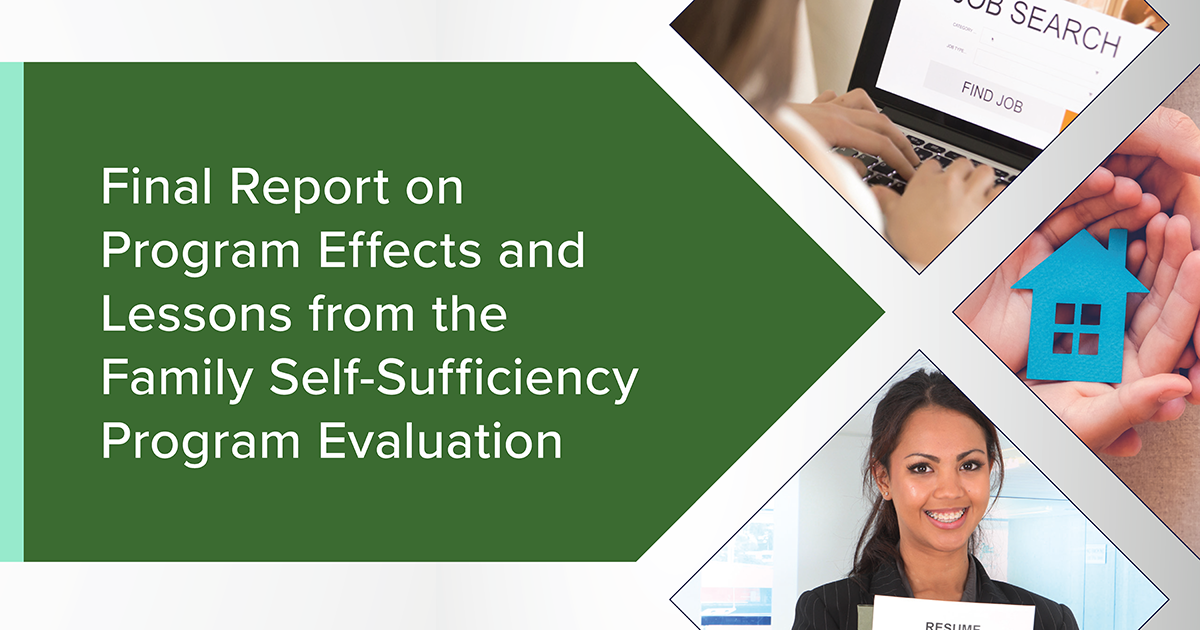The Family Self-Sufficiency Program Evaluation

Overview
The Family Self-Sufficiency (FSS) program is the main federal program for increasing employment and earnings and reducing reliance on government subsidies among recipients of housing subsidies. Created in 1990, FSS is administered by state and local public housing agencies with funding from the U.S. Department of Housing and Urban Development (HUD). In 2014, HUD allocated $75 million for public housing agencies to administer FSS to about 65,000 participants nationwide. Roughly 81 percent of FSS participants are housing voucher holders. .
FSS is a voluntary case-management and asset-building program that provides incentives to work. Participants are connected to services that can help them prepare for, find, and advance in work. Voucher recipients generally pay 30 percent of their income in rent (with the government making up the balance); as their earnings rise, so does their rent. FSS allows families to build savings while paying more in rent — the increase in a tenant’s share of rent is deposited into an interest-bearing “escrow account” maintained by the housing authority and paid to the participant when he or she completes the program.
In March 2012, HUD commissioned MDRC to conduct a national evaluation of FSS, building on MDRC’s New York City Work Rewards project, the first random assignment test of an FSS program. The national evaluation will provide evidence regarding the effectiveness of a variety of FSS programs in a diverse set of cities and local contexts.
Additional Project Details
Agenda, Scope, and Goals
This evaluation will make it possible to assess, with a high degree of rigor, whether FSS is helping families achieve economic independence and improve their quality of life.
Study enrollment targeted about 2,600 voucher holders, who have been randomly allocated in equal numbers to two groups: (1) a group that receives the FSS program (case management plus escrow savings) and (2) a control group not enrolled in FSS and not entitled to receive the escrow savings. Sample members will be tracked for at least three years after study entry.
Design, Sites, and Data Sources
The comprehensive evaluation is structured around three research components.
An impact study: The impact analysis will examine the program’s effects on a wide range of outcomes, including participants’ employment, earnings, family income, benefit receipt, poverty, material hardship, and other indicators of quality of life. It will also assess whether FSS produces different effects for different types of participants across different housing authorities and local conditions. The impact study will draw on baseline surveys, unemployment insurance wage records (for employment and earnings outcomes), housing authority records, and survey data.
An implementation and process study: This component will describe the FSS programs implemented by the different housing authorities in the study. The analysis will examine the processes by which families are recruited into the program (and the evaluation) and screened, the roles and responsibilities of the housing authorities’ key partners in serving those families, the priority levels the staffs and families attach to different program outcomes (for example, shorter-term or longer-term employment, skills building, and financial management), the methods used to market and administer the escrow asset-building component, and the variety of ways in which the programs try to engage participants in self-sufficiency activities. This component will draw on the housing authorities’ program management information systems and reports on specified performance indicators, field observations, and interviews with staff members and participants.
A cost-benefit study: This study will compare the costs of operating the FSS program with the economic benefits it produces. MDRC will calculate the costs of alternative services that people in the control group receive on their own (for example, education or training courses), and thereby estimate the net government expenditure on employment-related services for program participants. Survey data will permit a full accounting of the program’s effects on economic outcomes, which will in turn help determine whether the government and taxpayers experience a positive “return on investment,” and whether participants in the program are better off economically after other effects are taken into account, such as losses of certain transfer benefits and increases in tax payments and work-related expenses.
Voucher holders from 18 housing authorities across the country are participating in this evaluation:
- Housing Authority of the County of Alameda
- Housing Authority of the City of Los Angeles
- Housing Authority of the County of Riverside
- Orange County Housing Authority
- Deerfield Beach Housing Authority
- Housing Authority of the City of Fort Lauderdale
- Baltimore County Office of Housing
- Housing Opportunities Commission of Montgomery County
- Housing Authority of Kansas City, Missouri
- Youngstown Metropolitan Housing Authority
- Jersey City Housing Authority
- Akron Metropolitan Housing Authority
- Columbus Metropolitan Housing Authority
- Lucas Metropolitan Housing Authority
- Dallas Housing Authority
- Fort Worth Housing Authority
- Houston Housing Authority
- Tarrant County Housing Assistance Office
Featured Work
Findings From the Family Self-Sufficiency Evaluation








